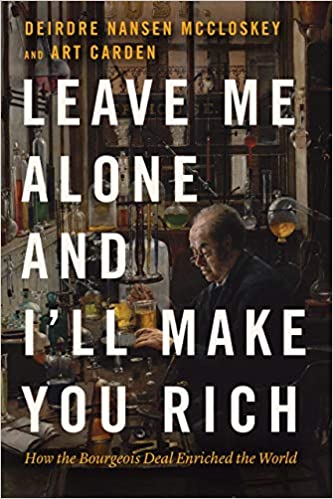Leave Me Alone and I’ll Make You Rich: Who Made Our Book Possible?

In October 2012, Deirdre McCloskey and I started collaborating on a condensed version of her massive “Bourgeois Era” Trilogy. The result, released today, is Leave Me Alone and I’ll Make You Rich: How the Bourgeois Deal Enriched the World (if you buy from that link, which is my Amazon affiliate link, you’ll make me marginally richer, or at least have the satisfaction of knowing that part of the proceeds will go into my informal “buy things for my students” fund). The book itself clocks in at a scant 189 pages of text, and we’ve worked to minimize the usual book-thickening academic bells and whistles like super-extensive endnotes. As someone who is kind of obsessive about documenting everything that can be documented, it gives me a bit of an eye twitch. But here we are.
The acknowledgments only run to about a single page. We could have very easily written a 200-plus-page companion volume that’s nothing but acknowledgments of the friends, colleagues, family members, mentors, acquaintances, and others who have helped us get here. Even that, though, would not have begun to acknowledge everyone who has had a hand in the book. If we were to write down literally everything that literally everyone did to make this book happen, I suppose that even the world itself could not contain the books that should be written. Amen.
Where to even start? I don’t know where the University of Chicago Press sources its bookbinding materials like paper and glue. A quick look inside the book tells me that “This paper meets the requirements of ANSI/NISO Z39-48-1992 (Permanence of Paper).” That’s a relief, I guess–I’d be lying if I said I’d spent many sleepless nights wondering how the publishers would comply with ANSI/NISO Z39-48-1992 requirements. I’d be lying if I said I had any idea what those requirements even are. And yet there are people working at the Press’s paper supplier who made sure the paper used to print our modest little volume met certain specifications for durability and permanence.
We should also acknowledge the computer programmers responsible for Microsoft Word, Scrivener, Google Scholar, Amazon, and all the other apps and programs we used. And the coffee farmers who grew the beans that became the many, many, many gallons of coffee I drank as we moved the book forward. And the people at the power company who have supplied me with electricity at home, at my Samford office, and elsewhere. And the miners who dug the coal the power company burned to generate the power (I wish I could thank the people who mined and refined the uranium that powered Bellefonte Nuclear Generating Station, but alas, “Meaningful construction progress at the site was halted in 1988”). And the optometrists who determined in 2014 that I should wear glasses and the manufacturers who made the glasses and the truckers who shipped the glasses and…
You get the point: it’s basically “I, Pencil”–and incidentally, lunch in Chicago where we were filming our commentaries for the I, Pencil movie is where Professor McCloskey first asked if I would be interested in the project. There’s essentially no end to the ways we could acknowledge people who had a role in making our book a reality. It might be kind of fun to simply select random people from the phone book (“What’s a ‘phone book’?” asks a Gen Z reader), find out what they do for a living, and then see how many steps it takes to get from them to Kevin Bacon Leave Me Alone and I’ll Make You Rich.
Why did they do it? Did they wake up every morning and say, “Some economists want to do a thing, and I want to help?” I doubt it. A great many people who helped along the way would no doubt be appalled by our politics (really, truly, classically liberal), our religion (Christianity), or our sports interests (which we’ve never really discussed in detail–I know McCloskey likes cricket; I don’t know how the game is played). And yet a decentralized market where, importantly, no one is “in charge” is a social space where we can all cooperate to mutual advantage.
People have pretty much always bought and sold in markets, but they have not always embraced markets as dignified or even nonobscene social spaces in which anything but mutual swindling and plunder takes place. They have not always embraced the commercial and technological heresies we call innovations that raised the average rate of per-capita income growth in places like the modern United States from roughly 0% per year to the positively insane rate of roughly 2% per year that we Americans have enjoyed since the early nineteenth century.
This mind-blowing fact–increases in real standards of living from the bottom to the top of the income distribution, year after year, with the benefits accruing disproportionately to the poor and the descendants of the poor, with no end in sight–did not happen for the usual reasons people point to. It wasn’t natural resources. The value of your copy of Leave Me Alone and I’ll Make You Rich doesn’t come from the trees farmed to make the paper or the oil that was refined into the fuel used to ship it. Institutions like secure property rights are necessary in the same way oxygen is necessary for a fire, but they aren’t sufficient. Slavery, imperialism, and colonialism are popular (and resurgent) explanations from the left, but “We are saying, to be precise, that war, slavery, imperialism, and colonialism were on the whole economically stupid” (p. 118).
It happened because we embraced the liberal idea of profit-tested dissent (with modification) from old ways of producing and exchanging and doing–what Adam Thierer has called Permissionless Innovation. We didn’t execute Bill Gates when Microsoft released Windows 95 or throw Steve Jobs off a cliff when he rolled out the iPad in 2010. Jobs didn’t have to get permission from puzzled members of the commentariat who wondered “What is it for?” or Luddites who worried that it would destroy the publishing industry when he was explaining what this thing that wasn’t a smartphone or a laptop but maybe kind of something in between could do.
We argue, furthermore, that it happened in Europe largely by accident and not because of anything intrinsically, fundamentally, or genetically European. The confluence of Reformation in how we think about God and one another, Reading material spilling from difficult-to-censor presses scattered across a politically-fragmented Europe, Revolt (by the Dutch against the Spanish in the sixteenth and seventeenth centuries), and Revolution (in England in the seventeenth century and in the United States and France in the eighteenth) created an intellectual and rhetorical shift. Liberty and dignity for common people doing common (buying low and selling high) and uncommon (innovating) things enriched the Western world. Now, with the broad diffusion of the Bourgeois Deal, we are in the middle of a Great Enrichment of the rest of the world, the Covid-19 pandemic notwithstanding.
It is customary for economics studies to include “policy implications,” and these are usually recommendations that this or that organization interfere violently with people’s affairs. And make no mistake: even if it is only implicit, there is violence inherent in the system. Our book’s policy recommendations can be reduced to two words: stop it. Consider the possibility that the people you wish to tax, regulate, subsidize, evaluate, and experiment upon should simply be left alone to go about their business. Stop it, we say, and let them make us rich.










